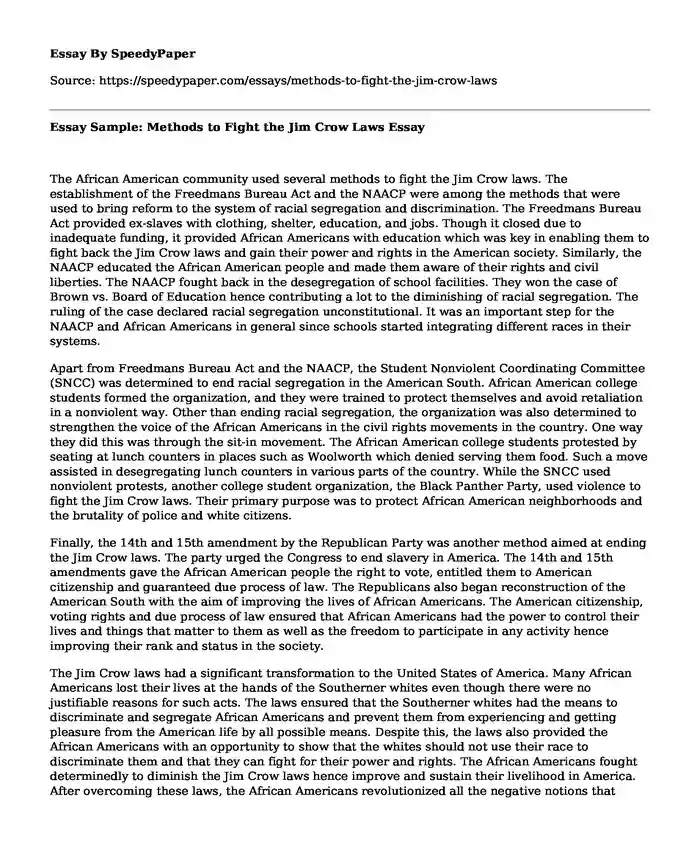The African American community used several methods to fight the Jim Crow laws. The establishment of the Freedmans Bureau Act and the NAACP were among the methods that were used to bring reform to the system of racial segregation and discrimination. The Freedmans Bureau Act provided ex-slaves with clothing, shelter, education, and jobs. Though it closed due to inadequate funding, it provided African Americans with education which was key in enabling them to fight back the Jim Crow laws and gain their power and rights in the American society. Similarly, the NAACP educated the African American people and made them aware of their rights and civil liberties. The NAACP fought back in the desegregation of school facilities. They won the case of Brown vs. Board of Education hence contributing a lot to the diminishing of racial segregation. The ruling of the case declared racial segregation unconstitutional. It was an important step for the NAACP and African Americans in general since schools started integrating different races in their systems.
Apart from Freedmans Bureau Act and the NAACP, the Student Nonviolent Coordinating Committee (SNCC) was determined to end racial segregation in the American South. African American college students formed the organization, and they were trained to protect themselves and avoid retaliation in a nonviolent way. Other than ending racial segregation, the organization was also determined to strengthen the voice of the African Americans in the civil rights movements in the country. One way they did this was through the sit-in movement. The African American college students protested by seating at lunch counters in places such as Woolworth which denied serving them food. Such a move assisted in desegregating lunch counters in various parts of the country. While the SNCC used nonviolent protests, another college student organization, the Black Panther Party, used violence to fight the Jim Crow laws. Their primary purpose was to protect African American neighborhoods and the brutality of police and white citizens.
Finally, the 14th and 15th amendment by the Republican Party was another method aimed at ending the Jim Crow laws. The party urged the Congress to end slavery in America. The 14th and 15th amendments gave the African American people the right to vote, entitled them to American citizenship and guaranteed due process of law. The Republicans also began reconstruction of the American South with the aim of improving the lives of African Americans. The American citizenship, voting rights and due process of law ensured that African Americans had the power to control their lives and things that matter to them as well as the freedom to participate in any activity hence improving their rank and status in the society.
The Jim Crow laws had a significant transformation to the United States of America. Many African Americans lost their lives at the hands of the Southerner whites even though there were no justifiable reasons for such acts. The laws ensured that the Southerner whites had the means to discriminate and segregate African Americans and prevent them from experiencing and getting pleasure from the American life by all possible means. Despite this, the laws also provided the African Americans with an opportunity to show that the whites should not use their race to discriminate them and that they can fight for their power and rights. The African Americans fought determinedly to diminish the Jim Crow laws hence improve and sustain their livelihood in America. After overcoming these laws, the African Americans revolutionized all the negative notions that people associated with them. However, despite the death of the Jim Crow laws, there is still some existence of the beliefs of the era in certain social and economic spheres of the United States of America.
References
Chin, Gabriel J. "The Voting Rights Act of 1867': The Constitutionality of Federal Regulation of Suffrage during Reconstruction." North Carolina Law Review 82 (2004).
Cimbala, Paul Alan, and Randall M. Miller. The Freedmen's Bureau and Reconstruction: Reconsiderations. Vol. 4. Fordham Univ Press, 1999.
Cleaver, Kathleen, and George Katsiaficas. Liberation, Imagination, and the Black Panther Party: A New Look at the Black Panthers and Their Legacy. Routledge, 2014.
Falck, Susan. "Jim Crow Legislation Overview." The History of Jim Crow (2002).
Fremon, David K. The Jim Crow laws and racism in American history. Enslow Publishers, 2000.
George, Charles. Life under the Jim Crow laws. Lucent Books, 2000.
Godsil, Rachel D. "Race Nuisance: The Politics of Law in the Jim Crow Era." Michigan Law Review (2006): 505-557.
"Jim Crow." Blackhistory.Com (2008). Accessed November 13, 2016. http://blackhistory.com/content/61586/jim-crow.
Litwack, Leon F. How Free is Free?:...
Cite this page
Essay Sample: Methods to Fight the Jim Crow Laws. (2019, Dec 10). Retrieved from https://speedypaper.net/essays/methods-to-fight-the-jim-crow-laws
Request Removal
If you are the original author of this essay and no longer wish to have it published on the SpeedyPaper website, please click below to request its removal:
- Psychology Essay Sample on Attachment Theory
- Wonder Woman: Hope, Humor and a New Perspective, Essay Example for Everyone
- Article Review Essay Sample: Recreating Drug Discovery for the 21st Century
- Comparison Between Early and Late Shock and Early and Late Sepsis
- Essay Sample on Six Step Model of Consumer Buying Behavior and Its Implications on Marketing
- Free Essay Example on Healthcare Reforms
- Police Brutality: Time for Reforms and Body Cameras - Essay Sample
Popular categories





